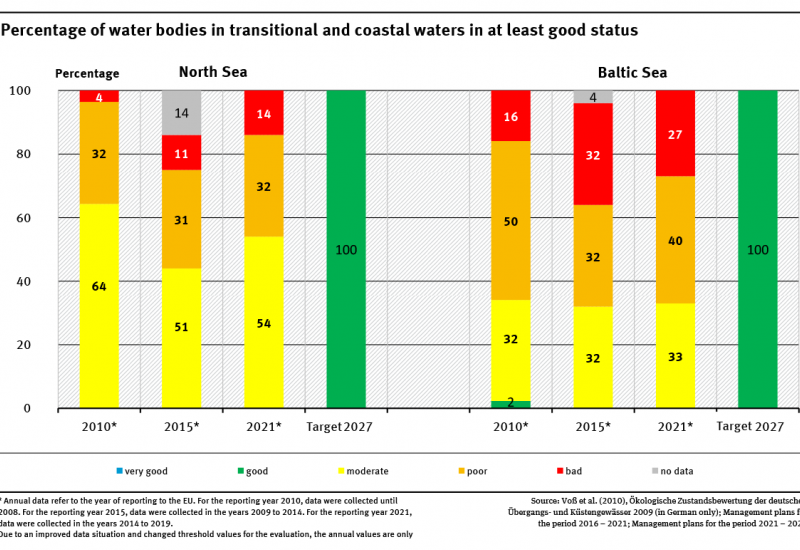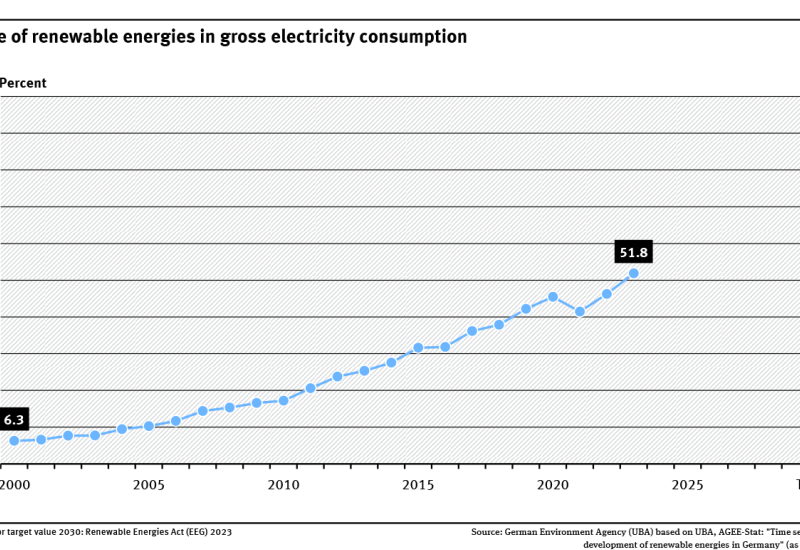Primary energy consumption (PEC) in Germany has fallen significantly since the end of the 2000s. It fell by 25 % between 2008 and 2023.According to the Energy Efficiency Act of 2023, PEC is to be reduced by 39% by 2030 compared to 2008.The 'Projection Report 2023' by the German Environment Agency indicates that the measures taken so far will likely be insufficient to achieve these targets.The ... read more
Your search for "energy transition" resulted in 13 hits:
Indicator: Ecological status of transitional and coastal waters
In 2021 no water body of transitional or coastal waters in the North and Baltic Seas achieved good or very good status.According to the European Water Framework Directive, by 2015 and with a deadline extension to 2027 all waters should have achieved at least a good ecological status.The time must now be used to reach the ambitious targets by 2027 at the latest.This will require considerable ad... read more
Indicator: Bathing water quality
All bathing waters in the EU were supposed to be of at least sufficient quality by 2015.97.9 % of inland bathing waters had excellent water quality in 2023. With that the target has been missed only slightly.Considering only those bathing waters that were explicitly assessed, 99.7 % of the bathing waters met the requirements in 2023.About 91 % of inland waters and almost 88 % of coastal bathin... read more
Indicator: Commitment to environmental protection
In the 2022 representative survey, 17 % said they were actively involved in environmental protection and nature conservation. In 2020, the figure was 19 % and in 2018 and 2016 12 % and 6 %.The indicator shows that the positive trend of previous years has not continued.Considering the single-digit percentages for active engagement from 2006 to 2014, the 17 % from 2022 represents a relatively la... read more
Indicator: Final energy consumption
The use of energy resources (energy consumption) is associated with many negative environmental impacts.The figure "final energy consumption" excludes the consumption of the energy system itself and reflects the energy consumption of end consumers.The Energy Efficiency Act sets the target that final energy consumption should be 26.5 % lower than in 2008 by 2030 (2045: - 45 %).The German Enviro... read more
Indicator: Share of renewables in gross electricity consumption
Electricity accounts for around a fifth of the total final energy consumption. This share is set to increase in the future.The share of renewable energies in gross electricity consumption rose from 6.3 % to 51.8 % between 2000 and 2023.The German Renewable Energy Sources Act (EEG) stipulates that the share of renewable energies should increase to at least 80 % by 2030.If Germany achieves its a... read more
Indicator: Global environmental footprint of consumption
Compared with 2010, energy consumption by private households and associated carbon dioxide emissions decreased slightly overall.Raw material use stagnated at the level of 2010.In its Sustainability Strategy the German government sets the goal of reducing the global environmental footprint of private household consumption in all three areas. read more








